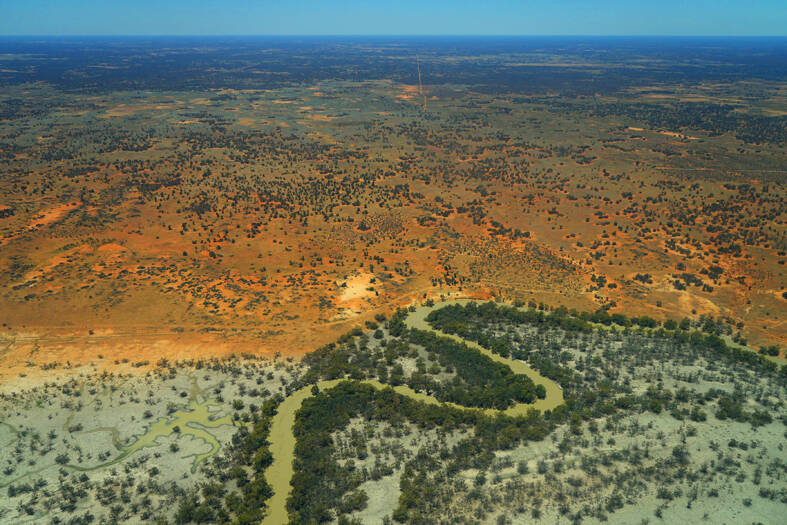Australia’s carbon credit scheme was undermined by damning new research yesterday, which found a world-leading reforestation project had been an underperforming “catastrophe.”
Vast swathes of land across Australia’s desert outback have been earmarked for native forest regeneration, which is meant to offset emissions as new trees suck up carbon.
However, researchers have found that across almost 80 percent of these plantations forest growth was either stagnant — or that woodlands were shrinking.

Photo: AFP
Despite this, Australia had used these projects to bank millions of tonnes in questionable carbon credits, scientists said, which are used to supposedly offset polluting industries.
“I think it can only be described, and I’m using generous words here, as a gross failure,” lead author Andrew Macintosh said.
“It’s a catastrophe,” he said, adding that it would “stain” Australia’s reputation.
Australia has set aside almost 42 million hectares under the scheme, an area larger than the landmass of Japan.
Researchers said it was “one of the world’s largest” natural carbon offset projects.
Officials claim that since 2013, the native forest spreading across this land has sucked up more than 27 million tonnes of carbon.
However, the peer-reviewed research, which used satellite imagery to chart forest growth, has cast serious doubt on this figure.
“They should be showing really strong increases in tree cover,” said Macintosh, a former chair of the government body responsible for tracking Australia’s carbon offsets. “And it’s not there, we’re not seeing it.”
Each ton of carbon sequestered by these forests is chalked up as a single carbon credit.
These carbon credits are then bought by mining companies, airlines and other heavily polluting industries to offset their emissions.
Australia was, in essence, selling carbon credits that did not exist, Macintosh said.
“There are meant to be checks along the way, but they’re not applying them,” said Macintosh, now a professor of environmental law at Australian National University. “What sort of faith do I have in the carbon credits scheme? It’s very, very low. Our scheme is without a doubt amongst the least transparent in the world.”
The Australian Clean Energy Regulator said that “a number of reviews have confirmed the integrity” of these carbon offsets.
It “only issues carbon credits where a project can demonstrate regenerating native forest,” the regulator said.
Australian Minister for Climate Change and Energy Chris Bowen said the assumptions underpinning the scheme remained “basically sound.”
Climate policy has long been a fraught affair in Australia, set back by a decade of political brawling dubbed the “climate wars.” Despite its growing vulnerability to climate-linked natural disasters, Australia remains one of the world’s biggest exports of gas and thermal coal.
The peer-reviewed research was published in the journal Communications Earth & Environment.
Australia’s carbon dioxide emissions per person are among the highest in the world at 15.3 tonnes, surpassing US levels, World Bank data showed.

Drug lord Jose Adolfo Macias Villamar, alias “Fito,” was Ecuador’s most-wanted fugitive before his arrest on Wednesday, more than a year after he escaped prison from where he commanded the country’s leading criminal gang. The former taxi driver turned crime boss became the prime target of law enforcement early last year after escaping from a prison in the southwestern port of Guayaquil. Ecuadoran President Daniel Noboa’s government released “wanted” posters with images of his face and offered US$1 million for information leading to his capture. In a country plagued by crime, members of Fito’s gang, Los Choneros, have responded with violence, using car

CYBERCRIME, TRAFFICKING: A ‘pattern of state failures’ allowed the billion-dollar industry to flourish, including failures to investigate human rights abuses, it said Human rights group Amnesty International yesterday accused Cambodia’s government of “deliberately ignoring” abuses by cybercrime gangs that have trafficked people from across the world, including children, into slavery at brutal scam compounds. The London-based group said in a report that it had identified 53 scam centers and dozens more suspected sites across the country, including in the Southeast Asian nation’s capital, Phnom Penh. The prison-like compounds were ringed by high fences with razor wire, guarded by armed men and staffed by trafficking victims forced to defraud people across the globe, with those inside subjected to punishments including shocks from electric batons, confinement

The team behind the long-awaited Vera Rubin Observatory in Chile yesterday published their first images, revealing breathtaking views of star-forming regions as well as distant galaxies. More than two decades in the making, the giant US-funded telescope sits perched at the summit of Cerro Pachon in central Chile, where dark skies and dry air provide ideal conditions for observing the cosmos. One of the debut images is a composite of 678 exposures taken over just seven hours, capturing the Trifid Nebula and the Lagoon Nebula — both several thousand light-years from Earth — glowing in vivid pinks against orange-red backdrops. The new image

Canada and the EU on Monday signed a defense and security pact as the transatlantic partners seek to better confront Russia, with worries over Washington’s reliability under US President Donald Trump. The deal was announced after a summit in Brussels between Canadian Prime Minister Mark Carney and European Commission President Ursula von der Leyen and European Council President Antonio Costa. “While NATO remains the cornerstone of our collective defense, this partnership will allow us to strengthen our preparedness ... to invest more and to invest smarter,” Costa told a news conference. “It opens new opportunities for companies on both sides of the